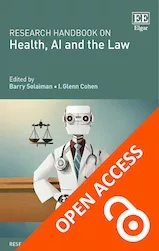New handbook chapter by Rune Nyrup and Beba Cibralic
Idealism, realism, pragmatism: three modes of theorising within secular AI ethics. In: Research Handbook on Health, AI and the Law, ed. Barry Solaiman and I. Glenn Cohen (Elgar Publishing, 2024): 203-218

Since the 2010s, rapid advancements in machine learning have enabled a host of new digital technologies – from increasingly advanced natural language processing systems and robot- ics to highly accurate image classification algorithms and big data analysis. As these new technological possibilities come into view, healthcare and medical research have become a prominent focus of practical applications. For instance, IBM Watson, a natural language processing system, became famous in 2013 for a high-profile win in the quiz show Jeopardy! Subsequently, IBM developed Watson for Oncology – a version of the system designed to analyse large bodies of medical literature and suggest treatment options to physicians in cancer care. Similarly, Google DeepMind leveraged its reputation for pioneering machine learning research into medical applications, such as image classification to detect early signs of diabetic retinopathy in eye scans, and AlphaFold, a system that predicts the 3D structure of proteins with high accuracy and, for this reason, will likely expedite the drug discovery process. More generally, new studies applying machine learning to medical problems are often published, reporting performance comparable to or exceeding human healthcare professionals.
Excerpt from the introduction.
https://doi.org/10.4337/9781802205657.00020
